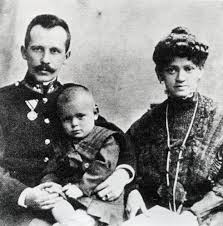On this May 18th we celebrate the first Pontiff with the name of John, the beloved disciple – and it was his birth name. The first Pope to change his name was the second Pope John, whose name had been Mercurius (so you might see why he changed it), who reigned a decade after the first, from 533-535.
Pope John, who died on this day in 526, was already frail when elected on August 13th, 523, well after the ‘fall of Rome’, when the semi-pagan German tribes ruled the Italian peninsula. The new pope was sent by King Theodoric to Emperor Justin at Constantinople, to seek better treatment for the Arians, a heresy that claimed Christ was not really, fully God, to which Theodoric, along with most of his fellow barbarians, heartily subscribed. Much easier to say that Christ was a kind of ‘demi-god’, rather than delve into the theological complexity of His dual nature, as true God and true Man. By turning Christ into a fellow ‘creature’, He became more, shall we say, pliable, one to whom autocratic rulers such as Theodoric need not fully submit. After all, only God has full authority, and if Christ is not God, well then, what power has Christ, really? Or, for that matter, His vicar, the Pope?
Pope John made the arduous 1300-mile journey to Constantinople – many days over dry dusty roads, mountains, vales and stormy seas – with a large and venerable retinue. Emperor Justin received the Pope warmly, and the delegation from the West got more or less what Theodoric wanted – almost – for Justin did not grant the concession that those clerics who converted from Arianism to Catholicism would be ‘restored’, that is, keep their hierarchical positions, for their former heresy precluded them, as possibly forming an undermining ‘fifth column’ in the Church. (One wonders if things have changed all that much.)
So upon the Pope’s return, Theodoric accused him of conspiring with the emperor, and in a fury had him thrown into a dank prison in the capital of Ravenna, where he, already old and frail, died on this day of May in 526 of neglect and ill-treatment, hailed as a martyr for the truth.
We all must witness to that same truth in our own way, as God so wills.
And, in one of those coincidences of history, we also celebrate what would have been Pope Saint John Paul II’s 101st birthday, ten short of Bilbo Baggins’ in the opening scene of the Fellowship, which was old for a hobbit, and certainly would be old even for the oldest of Popes. Benedict, the XVI, who holds the controversial title of Pope Emeritus – the first Pope ever to do so, but, then there have only been five or so that have resigned from papacy – turned 94 on April 16th. But the oldest actual reigning Pontiff was Leo XIII, who held the Chair until he went to see Saint Peter at the venerable age of 93, making him the oldest Pope in history. I am sure John Paul is celebrating in fine style in heaven; even if in Poland, and other European cultures, they do not celebrate their birthdays so much as the days of their patron saints, which for Karol Wojtyla was November 4th, has namesake, Saint Charles Borromeo.
It is only in the breadth of eternity that we can truly discern the events not only of this world, but in each of our individual lives. What in the rather limited scale of secularity appears as ‘failure’ may in fact be our greatest success, which is why we honour martyrs like Pope John.
A final thought: The names of the Evangelists and even the Apostles, have never popular with Popes. There has never been a Pope Matthew, Luke nor even Andrew; there was one Pope Mark who reigned less than a year, and, of course, the original Pope Peter. The prophecies of the 11th century Irish monk Malachy, likely-largely-apocryphal, declare that the next Pope to choose the name ‘Peter’ will be the last Pope at the end of the world. But this may be figurative; or the prophecy more likely spurious. The end will arrive in God’s good time, for each of us, and for the world. In the meantime, one must keep one’s wits about one, and follow the inspirations of the Holy Spirit, who will guide us into all the truth.
Be not afraid, for I am with you…to the end.

